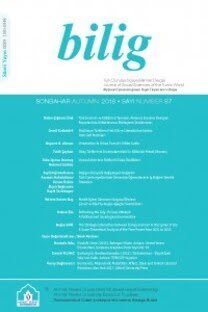Tataristan’da Etnik Mobilizasyon ve Egemenliğin Yükselişi ve Çöküşü: Elit Devamlığı ve Hakimiyetinin Modelleri
Bu makale Tataristan’ın içiçe geçmiş etnik mobilizasyon ve egemenlik kavramlarının yükselişi ve çöküşünü mikro ve makro kronolojik bir açıdan incelemeyi amaçlar. Bu makalenin bulguları Tatar elitlerinin özerkliği şekillendirmede her zaman hegemonik ve belirleyici olduğunu göstermiştir. Etnik nomenklatura söylemiyle birleşen Sovyet ulus politikalarının patika bağımlılığı, Tatar elitlerine egemenliği genişletmek için federal merkeze karşı meydan okuma olanağı sağladı. Ancak Tatar elitleri, Putin döneminde Moskova’nın yükselen devlet kapasitesiyle karşılaştığında kendi elit güç ve zenginliklerini riske atmamak amacıyla uyumcu bir strateji izlediler.
The Rise and Fall of Ethnic Mobilization and Sovereignty in Tatarstan: Patterns of Elite Continuity and Dominance
This article aims to examine the rise and fall of the intertwined concepts of ethnic mobilization and sovereignty of Tatarstan from both micro and macro chronological perspectives. The findings of the article indicate that Tatar elites were always hegemonic and decisive in shaping the autonomous sovereignty. The path dependency of Soviet nationality policies combined with an ethnic nomenklatura discourse enabled the Tatar elites to challenge the Federal center for the expansion of sovereignty. However, the Tatar elites pursued an adoptive strategy in order not to risk their elite power and wealth when faced with the growing state capacity of Moscow in the Putin era.
Keywords:
Ethnicity, sovereignty, Tatarstan, Russian federalism, nomenklatura political elites,
___
- Aktürk, Şener. Regimes of ethnicity and nationhood in Germany, Russia, and Turkey. Cambridge University Press, 2012.
- Cashaback, David. “Assessing Asymmetrical Federal Design in the Russian federation: A case study of language policy in Tatarstan.” Europe-Asia Studies, vol. 60, no. 2, 2008, pp. 249-275.
- Chebankova, Elena. “Adaptive Federalism and Federation in Putin’s Russia.” Power and Policy in Putin’s Russia, ed. Richard Sakwa, Routledge, 2009, pp. 111-133.
- Chernobrovkina, Elena. Demokraticheskaia Oppozitsia Tatarstana: 10 Let Puti. Remark, 2010.
- Danks, Catherine. Politics Russia. Routledge, 2014.
- Emel’yanova, Galina. “Shaimievs Khanate on the Volga and its Russian Subjects.” Asian Ethnicity, vol 1, no. 1, 2000, pp. 37-52.
- Faller, Helen. Nation, Language and Islam: Tatarstan’s Sovereignty Movement. CEU Press, 2011.
- Farukshin, Mithad. “Tatarstan’s Oil Has Already Been Divided Up.” Russian Regional Report, vol. 1, no. 38, 1997, pp. 3-15.
- Ganguly, Sumit, and William Thompson. Ascending India and Its State Capacity: Extraction, Violence and Legitimacy. Yale University Press, 2017.
- George, Julia. The Politics of Ethnic Separatism in Russia and Georgia. Palgrave Macmillan, 2009.
- Gibadullin, Rustam. Tatarskoe Natsional’noe Dvizhenie: Politicheskaya Deyatel’noct’ I Vliyanie V Tatarstane (1988-1992). Izdatel’ctvo Kazanskogo Universiteta, 1998.
- Giuliano, Elise. Constructing grievance: ethnic nationalism in Russia’s republics. Cornell University Press, 2011.
- Graney, Katherine. Of Khans and Kremlins: Tatarstan and the Future of Ethno-Federalism in Russia. Lexington Books, 2009.
- Harasymiw, Bohdan. “Nomenklatura: The Soviet Communist Party’s Leadership Recruitment System”. Canadian Journal of Political Science, vol. 2, no. 4, 1969, pp. 493- 512.
- Iskhakov, Damir. Suverennii Tatarstan, Dokumenty, Materialy, Hronika. Rossiskaya Akademiya Nauk, 1998.
- Kahn, Jeffrey. Federalism, Democratization, and the Rule of Law in Russia. Oxford University Press, 2002.
- Kondrashov, Sergei. Nationalism and the drive for sovereignty in Tatarstan, 1988-92: origins and development. Macmillan Press, 2000.
- Kryshtanovskaya, Olga, and Stephen White. “From Soviet Nomenklatura to Russian Élite.” Europe-Asia Studies, vol. 48, no. 5, 1996, pp. 711-733.
- Langdon, Kate, and Vladimir Tismaneanu. Putins’s Totalitarian Democracy: Ideology, Myth, and Violence in the Twenty-First Century. Palgrave Macmillan, 2020.
- Martin, Terry. The Affirmative Action Empire: Nations and Nationalism in the Soviet Union, 1923-1939. Cornell University Press, 2001.
- Matsuzato, Kimitaka. “From Ethno-Bonapartism to Centralized Caciquismo: Characteristics and Origins of the Tatarstan Political Regime, 1900-2000.” Journal of Communist Studies and Transition Politics, vol. 17, no. 4, 2001, pp. 98-123.
- Petrov, Nikolay. “Governance and the types of political regimes in the ethnic regions of Russia.” Menaging Ethnic Diversity in Russia, eds. Oleh Protsyk and Harzl Benedikt, Routledge, 2013, pp. 141-156.
- Petrov, Nikolay, and Darrell Slider. “Regional Politics.” Putin’s Russia: Past Imperfect, Future Uncertain, ed. Stephen K. Wagren, Rowman&Littlefield, 2015, pp. 63-83.
- Rigby, Thomas Henry. “Staffing USSR Incorporated: The origins of the nomenklatura system.” Soviet Studies, vol. 40, no. 4, 1998, pp. 523-537.
- Ross, Cameron. Federalism and democratization in Russia. Manchester University Press, 2002.
- Sakwa, Richard. Soviet politics in Perspective. Routledge, 1998.
- Sharafutdinova, Gulnaz. “Paradiplomacy in the Russian Regions: Tatarstans Search for Statehood.” Europe-Asia Studies, vol. 55, no 4, 2003, pp. 613-629.
- Sharafutdinova, Gulnaz. Political consequences of crony capitalism inside Russia. Notre Dame: University of Notre Dame Press, 2011.
- Sharafutdinova, Gulnaz. “Getting The ‘Dough’ And Saving The Machine: Lessons From Tatarstan.” Demokratizatsiya, vol. 21, no. 4, 2013, pp. 507-529.
- Shcherbak, Andrei. “Nationalism in the USSR: A Historical and Comparative Perspective” National Research University Higher School of Economics Research Paper, vol. 27, no. 1, 2013, pp. 1-31.
- Slezkine, Yuri. “The USSR as a Communal Apartment, or How a Socialist State Promoted Ethnic Particularism.” Slavic Review, vol. 53, no. 2, 1994, pp. 414-452.
- Slider, Darrer. “A Federal State.” Developments in Russian Politics, eds. Stephen White et al, Durham University Press, 2014, pp. 157-173.
- Smith, Jeremy. Red nations: the nationalities experience in and after the USSR. Cambridge University Press, 2013.
- Walker, Edward. “The Dog that Didn’t Bark: Tatarstan and Asymmetrical Federalism in Russia.” Harriman Review, vol. 9, no. 2, 1996, pp. 1-35.
- ISSN: 1301-0549
- Yayın Aralığı: Yılda 4 Sayı
- Başlangıç: 1996
- Yayıncı: Ahmet Yesevi Üniversitesi
Sayıdaki Diğer Makaleler
Kum Altında Kalan Kadim Türkistan Şehirlerine Ziyaret
Ermeni Çocuk Edebiyatı Eserlerinde Sürgün ve Göç Teması
Ahundzade’de Millet Fikrinin Oluşumunun Miroslav Hroch’un yaklaşımı Çerçevesinde Değerlendirilmesi
Kautilya’nın Dış Politika Kuramı Çerçevesinde Hindistan’ın Orta Asya İle İlişkileri, 1991-2019
İsen, Mustafa. Usûlî Dîvânı (İnceleme- Tenkitli Metin-Tıpkıbasım). TYEK Yayınları, 2020.
Dil Devrimi Sırasında Türk Lehçelerinden Alıntılar: Geçmiş ve Bugün
